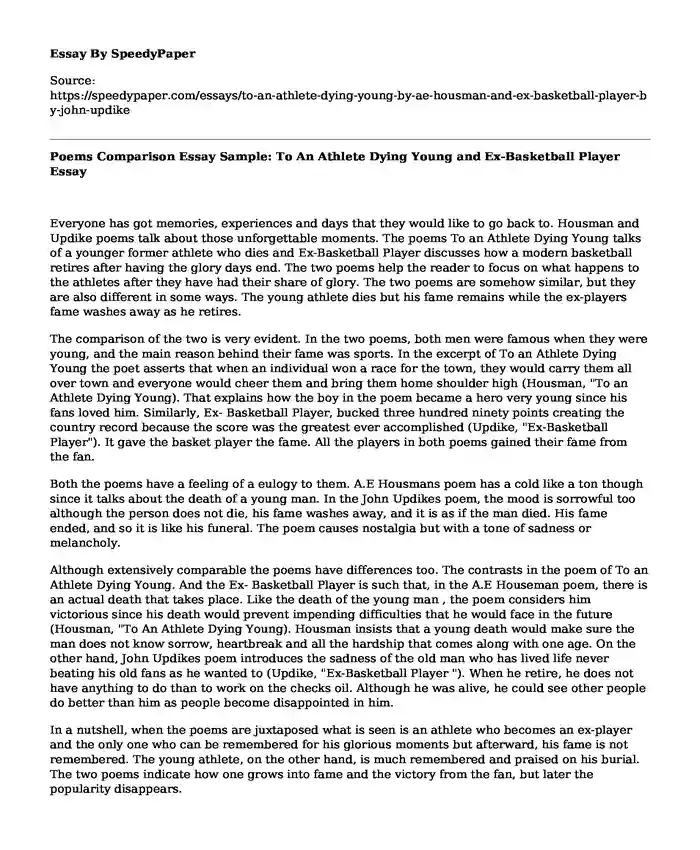Everyone has got memories, experiences and days that they would like to go back to. Housman and Updike poems talk about those unforgettable moments. The poems To an Athlete Dying Young talks of a younger former athlete who dies and Ex-Basketball Player discusses how a modern basketball retires after having the glory days end. The two poems help the reader to focus on what happens to the athletes after they have had their share of glory. The two poems are somehow similar, but they are also different in some ways. The young athlete dies but his fame remains while the ex-players fame washes away as he retires.
The comparison of the two is very evident. In the two poems, both men were famous when they were young, and the main reason behind their fame was sports. In the excerpt of To an Athlete Dying Young the poet asserts that when an individual won a race for the town, they would carry them all over town and everyone would cheer them and bring them home shoulder high (Housman, "To an Athlete Dying Young). That explains how the boy in the poem became a hero very young since his fans loved him. Similarly, Ex- Basketball Player, bucked three hundred ninety points creating the country record because the score was the greatest ever accomplished (Updike, "Ex-Basketball Player"). It gave the basket player the fame. All the players in both poems gained their fame from the fan.
Both the poems have a feeling of a eulogy to them. A.E Housmans poem has a cold like a ton though since it talks about the death of a young man. In the John Updikes poem, the mood is sorrowful too although the person does not die, his fame washes away, and it is as if the man died. His fame ended, and so it is like his funeral. The poem causes nostalgia but with a tone of sadness or melancholy.
Although extensively comparable the poems have differences too. The contrasts in the poem of To an Athlete Dying Young. And the Ex- Basketball Player is such that, in the A.E Houseman poem, there is an actual death that takes place. Like the death of the young man , the poem considers him victorious since his death would prevent impending difficulties that he would face in the future (Housman, "To An Athlete Dying Young). Housman insists that a young death would make sure the man does not know sorrow, heartbreak and all the hardship that comes along with one age. On the other hand, John Updikes poem introduces the sadness of the old man who has lived life never beating his old fans as he wanted to (Updike, "Ex-Basketball Player "). When he retire, he does not have anything to do than to work on the checks oil. Although he was alive, he could see other people do better than him as people become disappointed in him.
In a nutshell, when the poems are juxtaposed what is seen is an athlete who becomes an ex-player and the only one who can be remembered for his glorious moments but afterward, his fame is not remembered. The young athlete, on the other hand, is much remembered and praised on his burial. The two poems indicate how one grows into fame and the victory from the fan, but later the popularity disappears.
References
Housman, Alfred Edward. "To An Athlete Dying Young By A. E. Housman". Poetry Foundation. N.p., 2016. Web. 7 Nov. 2016.
Updike, John. "Ex-Basketball Player By John Updike". Poetry Foundation. N.p., 2016. Web. 7 Nov. 2016.
Cite this page
Poems Comparison Essay Sample: To An Athlete Dying Young and Ex-Basketball Player. (2019, Dec 10). Retrieved from https://speedypaper.com/essays/to-an-athlete-dying-young-by-ae-housman-and-ex-basketball-player-by-john-updike
Request Removal
If you are the original author of this essay and no longer wish to have it published on the SpeedyPaper website, please click below to request its removal:
- Free Essay Example: Same-Sex Relationships are Normal
- The Thought of Pursuing a Bachelor's Degree, Application Essay Sample
- Essay Sample Dedicated to Leadership in Healthcare
- Free Essay on Walt Whitman's Song of Myself: Song of Democracy and Oneness of Mankind
- Article Analysis Essay on 'Why Chinese Mothers Are Superior' by Amy Chua
- Free Essay Sample - Henri Poincare
- Free Paper Sample on Romanticism in the Birthmark
Popular categories





